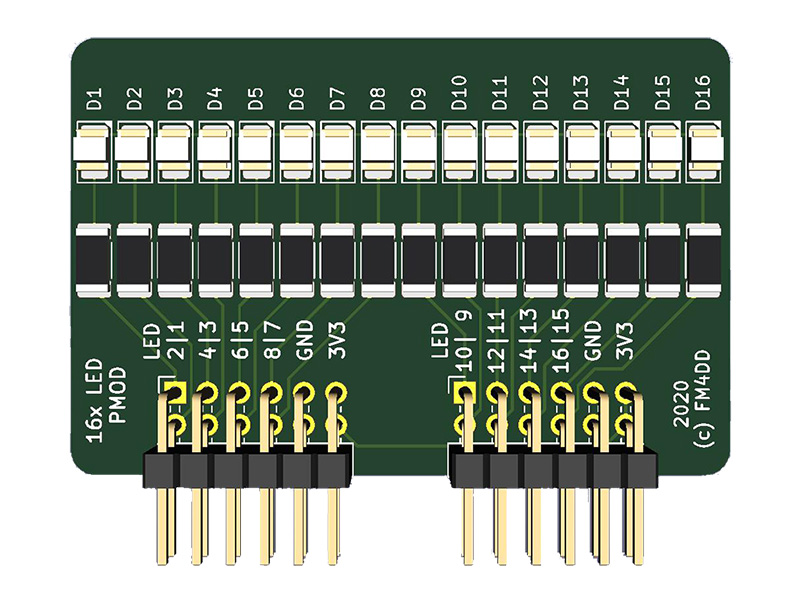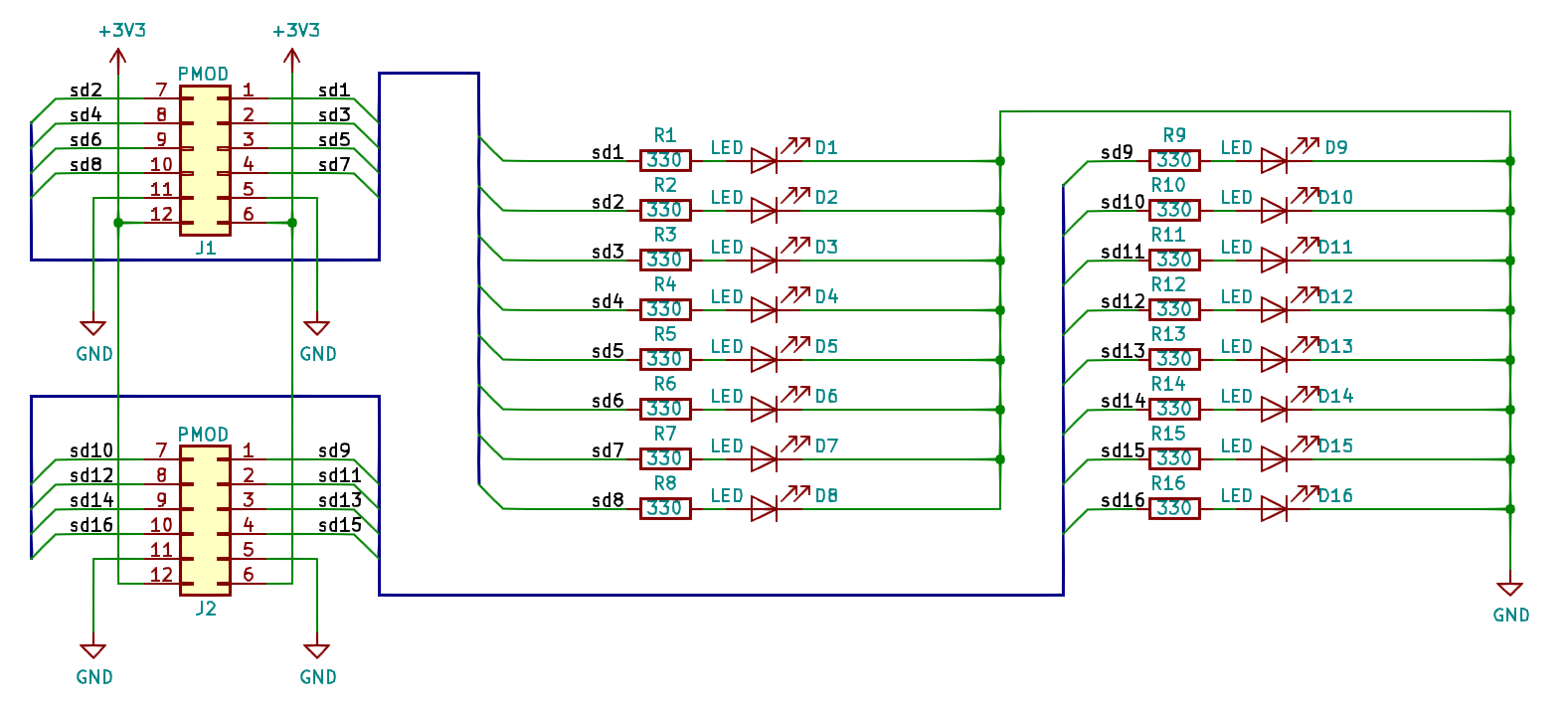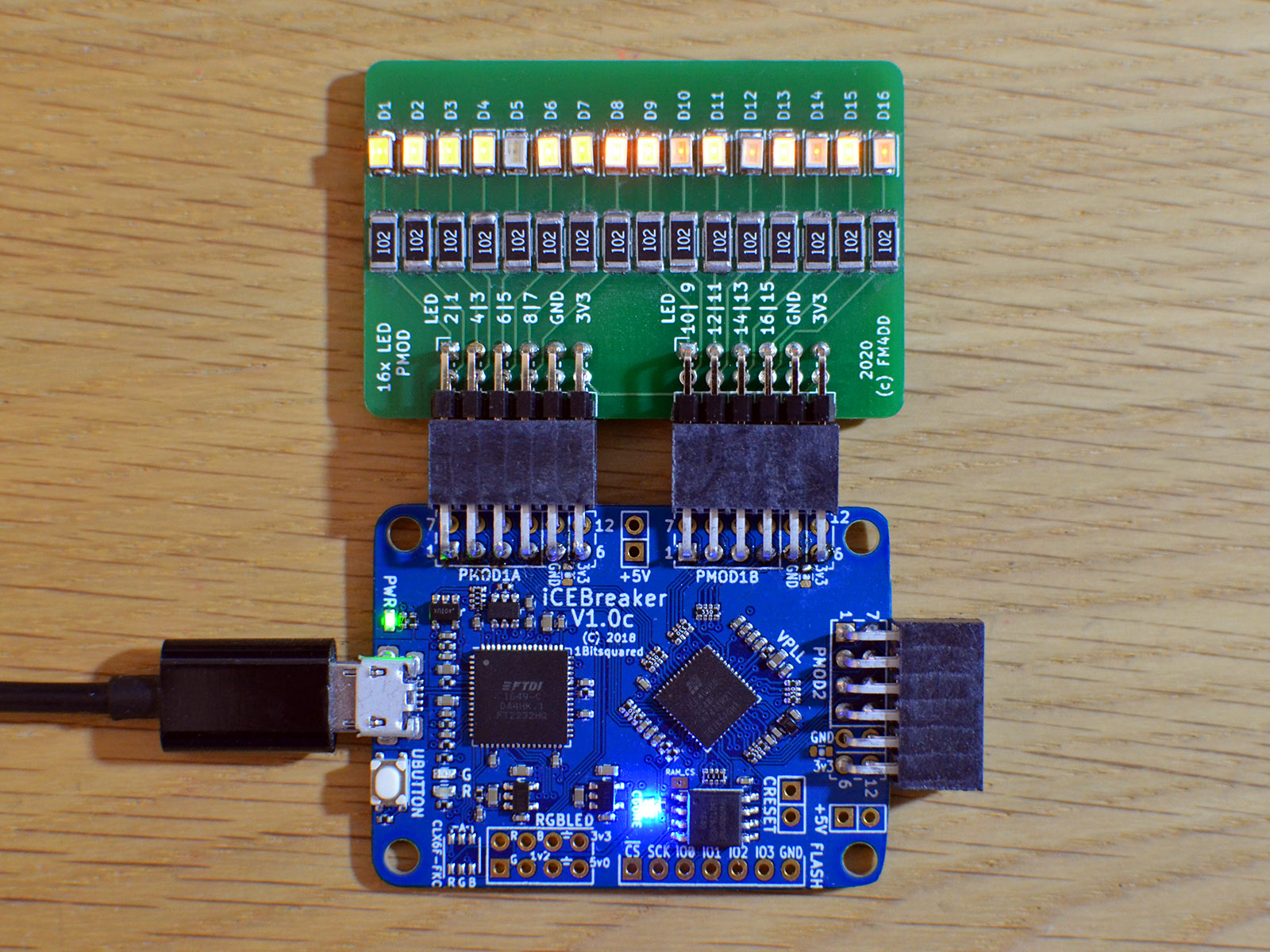16LED PMOD
Description
 This PMOD provides 8x dual-color LED display output to FPGA designs via two double row PMODs.
It is possible to install either type of dual-color LEDs: “common cathode” or “common anode”. The default is “common cathode”, which allows for working with normal logic. WIth normal logic, setting the output “HIGH” lights up the LED. If "common anode" LEDs are installed, JP1 must separate GND, and close the connection to + 3.3V. Common anode uses inverted logic, The LEDs light up when the output is set "LOW".
This PMOD provides 8x dual-color LED display output to FPGA designs via two double row PMODs.
It is possible to install either type of dual-color LEDs: “common cathode” or “common anode”. The default is “common cathode”, which allows for working with normal logic. WIth normal logic, setting the output “HIGH” lights up the LED. If "common anode" LEDs are installed, JP1 must separate GND, and close the connection to + 3.3V. Common anode uses inverted logic, The LEDs light up when the output is set "LOW".
Schematic
PCB Gerber
Pin Assignments
IceBreaker v1.0
| J1# | Label | Description | PMOD1A |
|---|---|---|---|
| 1 | D1 | LED D1 | 4 |
| 7 | D2 | LED D2 | 3 |
| 2 | D3 | LED D3 | 2 |
| 8 | D4 | LED D4 | 48 |
| 3 | D5 | LED D5 | 47 |
| 9 | D6 | LED D6 | 46 |
| 4 | D7 | LED D7 | 45 |
| 10 | D8 | LED D8 | 44 |
| J2# | Label | Description | PMOD1B |
|---|---|---|---|
| 1 | D9 | LED D9 | 43 |
| 7 | D10 | LED D10 | 42 |
| 2 | D11 | LED D11 | 38 |
| 8 | D12 | LED D12 | 36 |
| 3 | D13 | LED D13 | 44 |
| 9 | D14 | LED D14 | 32 |
| 4 | D15 | LED D15 | 31 |
| 10 | D16 | LED D16 | 28 |
DE0-Nano-SoC
| J1# | Label | Description | GPIO0A | GPIO1A |
|---|---|---|---|---|
| 1 | D2 | LED D1 | PIN_AF8 | PIN_AH27 |
| 2 | D1 | LED D2 | PIN_W12 | PIN_AA15 |
| 3 | D4 | LED D3 | PIN_AB4 | PIN_AH24 |
| 4 | D3 | LED D4 | PIN_Y8 | PIN_AG26 |
| 7 | D6 | LED D5 | PIN_Y4 | PIN_AE22 |
| 8 | D5 | LED D6 | PIN_W8 | PIN_AF23 |
| 9 | D8 | LED D7 | PIN_U11 | PIN_AG20 |
| 10 | D7 | LED D8 | PIN_Y5 | PIN_AF21 |
| J2# | Label | Description | GPIO0B | GPIO1B |
|---|---|---|---|---|
| 1 | D13 | LED D13 | PIN_AG6 | PIN_AD19 |
| 2 | D9 | LED D9 | PIN_AF4 | PIN_AH23 |
| 3 | D14 | LED D14 | PIN_AE4 | PIN_AE20 |
| 4 | D10 | LED D10 | PIN_AF5 | PIN_AG23 |
| 7 | D15 | LED D15 | PIN_T11 | PIN_AE24 |
| 8 | D11 | LED D11 | PIN_T13 | PIN_AE19 |
| 9 | D16 | LED D16 | PIN_AF6 | PIN_AD20 |
| 10 | D12 | LED D12 | PIN_AE7 | PIN_AF18 |
Example Code
Verilog
Verilog test program pmod_16led_1.v (top-level):
// -------------------------------------------------------
// This program is a binary counter displayed on the
// on the pmod D2-8, and 9-16. D1 is pulsing 1Hz clock.
// 12MHz clock: set breakpoint at 23'd5999999
// 50MHz clock: set breakpoint at 25'd24999999
// -------------------------------------------------------
module pmod_16led_1 (
input clk,
output reg [0:7] pmodled1,
output reg [0:7] pmodled2,
);
reg [22:0] count = 23'd0;
reg clk_1hz = 1'b0;
assign pmodled1[0] = clk_1hz;
reg [6:0] lednum1 = 7'd0;
assign pmodled1[7:1] = lednum1;
reg [7:0] lednum2 = 8'd0;
assign pmodled2[7:0] = lednum2;
always @(posedge clk)
begin
count <= count + 1;
if(count == 23'd5999999)
begin
count <= 0;
clk_1hz <= ~clk_1hz;
lednum1 <= lednum1 + 1;
lednum2 <= lednum2 + 1;
end
end
endmoduleVHDL
This is Verilog test program pmod_16led_1.v converted to VHDL as pmod_16led_2.vhd
library ieee;
use ieee.std_logic_1164.all;
use ieee.numeric_std.all;
entity pmod_16led_2 is
port (
clk: in STD_LOGIC;
pmodled1: out STD_LOGIC_VECTOR(0 to 7) := "00000000";
pmodled2: out STD_LOGIC_VECTOR(0 to 7) := "00000000"
);
end pmod_16led_2;
architecture arch of pmod_16led_2 is
signal clk_1hz: STD_LOGIC := '0';
signal lednum1: STD_LOGIC_VECTOR(6 downto 0) := "0000000";
signal lednum2: STD_LOGIC_VECTOR(7 downto 0) := "00000000";
begin
counter_p: process( clk, clk_1hz, lednum1, lednum2 )
variable count: INTEGER := 0;
begin
if( rising_edge(clk) ) then
count := count + 1;
if( count = 24999999 ) then
count := 0;
clk_1hz <= NOT clk_1hz;
lednum1 <= std_logic_vector( unsigned(lednum1) + 1);
lednum2 <= std_logic_vector( unsigned(lednum2) + 1);
end if;
end if;
pmodled1(0) <= clk_1hz;
pmodled1(1) <= lednum1(6);
pmodled1(2) <= lednum1(5);
pmodled1(3) <= lednum1(4);
pmodled1(4) <= lednum1(3);
pmodled1(5) <= lednum1(2);
pmodled1(6) <= lednum1(1);
pmodled1(7) <= lednum1(0);
pmodled2 <= lednum2;
end process counter_p;
end arch;16LED PMOD, connected to an IceBreaker v1.0 board

